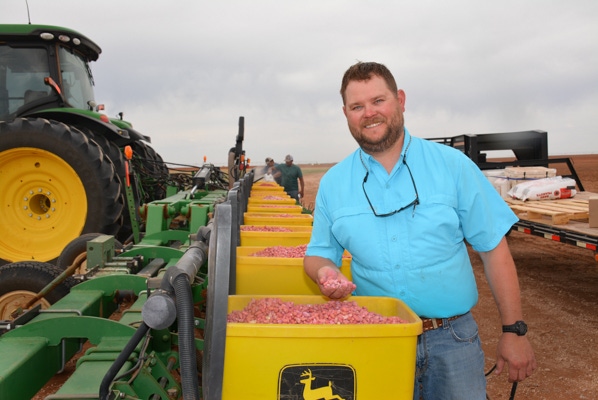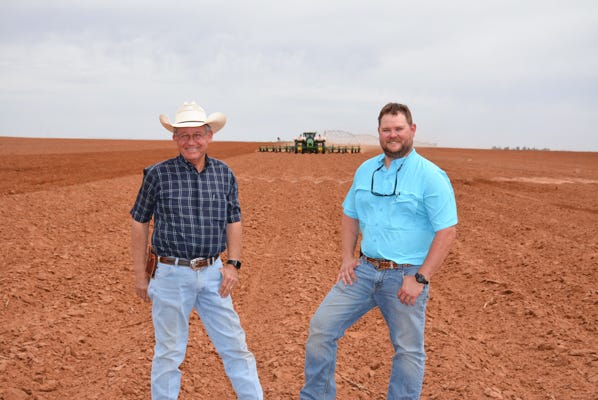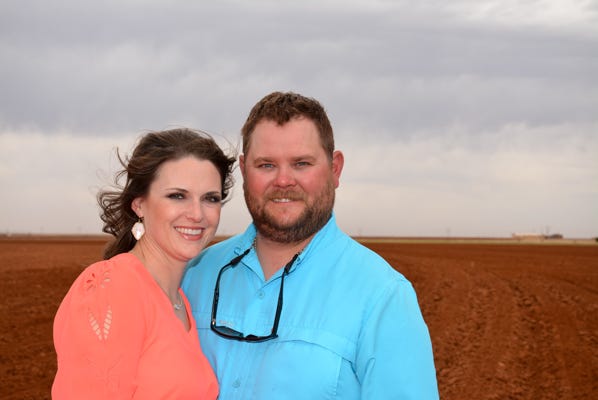
Texas peanut farmer Mason Becker is the first to admit he knew the most about farming the day before he started. But once he started doing it, he says, he completely lost his mind. “I thought I had it all figured out,” he laughingly recalls. “But once I started doing it, I quickly learned how much I didn’t know.
“Dad, who was one of the first to grow peanuts in Terry County, told me, ‘If you’re going to grow peanuts, you’d better throw the kitchen sink at it.’” And for the last nine years, that’s exactly what Becker’s been doing. The 32-year-old grows semi-irrigated peanuts and cotton in the sandy soils of western Terry County.
It hasn’t taken Becker long to learn. Beyond the lecture halls of Texas Tech University and TCU’s Ranch Management School, plus serving in leadership positions within the peanut industry and working alongside his father since he was 12, he has been well-schooled in the art of peanut farming. His success has earned him the 2018 Farm Press Peanut Efficiency Award for the Southwest region.
Farm Press, in cooperation with the Southern Peanut Growers Conference, each year recognizes three growers from the Southeast and Southwest regions who produce the highest yields at the lowest cost per acre.
In 2017, Becker not only produced yields 20 percent higher than his average, but also branched out into a new market — growing organic Algrano236 Spanish peanuts. “Last year, I had 55 acres, and I netted more on those 55 acres than I did on 240 acres of conventionals,” he says. “It was unbelievable; the contract price was three times higher.”
Overall for 2017, he says, the quality of his peanuts was good. “We had a little bit of a scare early on when we started digging with the wet weather — it was a little concerning. We started our diggers earlier than what we’d like, but the quality seemed to hold pretty well. Overall, it was a pretty decent peanut year.” He grows Sullivan VA, GA-11J VA, and Wynne VA varieties.
See West Texas farmer heads for the beach
NEED A PASSION
A fourth-generation farmer, Becker grew up working weekends and summers on the family farm. Raised by his dad since he was 12 years old, he was well-schooled in peanut production — and life — by his father, Monty Henson, himself a veteran peanut grower. “He’s taught me everything I know,” Becker declares.

Monty Henson, left, with his son, Mason Becker, right, in Becker's peanut field during planting. Becker credits his father, Henson, for teaching him everything he knows about farming.
“When I first started to farm, he told me, ‘Mason, if you’re going to farm, you’d better have a passion for it — and you’ve got to have faith. Sometimes we aren’t sure how we are going to make it to the next year, but God has always taken care of us. I have gone through some really tough times, but it has shaped me and made me into a better person.’"
Farming alongside his dad, Becker produced his first crop in 2009. And while his parents leased him equipment and co-signed notes to help him get started, it was always his goal to farm on his own. By 2011/2012, he was able secure financing for his own operation and ease some of the burden on his parents.
“Since then, it’s gotten tougher, with the way the weather and everything has worked out,” Becker says. “But that’s a part of farming, something everybody goes through — growing pains. But God’s provided a way for us when we didn’t think there was one, so I can’t complain.”
One “Montyism” that Becker says has been a big influence on his farming career is: “In this day and age of farming, a guy can go broke sitting on a tractor.’
“I never really understood what that meant until I started farming and growing my own operation,” Becker says. “What he meant was the value of being a businessman — and not just a farmer. It’s easy enough to go broke farming, but if you spend all of your time sitting on a tractor and don’t tend to business, budgeting, and all the different aspects that go into farming, you don’t really know what’s happening on the financial side.
“I still love getting on the tractor, and I’d prefer being on the tractor day-in and day-out, but there’s just so many things you’ve got to take care of on the business side of a farm.”
A NUMBER TO EVERYTHING
Henson, an “Excel spreadsheet wizard” as Becker calls him, has taught Becker the value of budgeting and how to put a number to everything. “Obviously, in farming everything doesn’t always work out like it looks on paper,” he says. “But when you’re just starting out, if you don’t have a baseline and know your input costs, break-even prices, and cost of production, you’re just kind of throwing money in the wind.”
Assisting Becker on the farm, so he can tend to those business decisions, are brothers Kevin and Travis Gamez, both of Terry County. “I’ve got two fulltime guys working with me — and I say working with me because the farm is more than just for my family,” Becker says.
“They have kids and families. This farm provides for all of us. I definitely couldn’t do what I do without help from good men like them.”
On the home front, Becker jokes that wife Megan is not only “on the hook for half the debt,” she also works full-time while mothering their two sons, Madden and Macall, keeps the farm books, and shares in discussions of major farm decisions. “We’re partners in every sense of the word,” he says. “She’s a huge emotional support, and many times, balances me out. She’s a phenomenal woman, and I’m certainly blessed to have her.”
See Photo gallery Farm Press names Mason Becker 2018 Southwest Peanut Efficiency winner
CONCERN FOR GRASSES
Breaking ground for his organic peanut acres, on land that was originally CRP grassland, may have avoided pressure from broadleaf weeds. But it also raised concerns about grasses. “CRP has really done the job of weed control for the last 20 years,” Becker says, “but grass coming back is a main issue. We have a grass called Texas panicum — a really invasive species that’s really hard to control.”
With the grass in his organic acres, the only means of control is hoeing, something he hired to be done about every two weeks. “We probably had $100 per acre hoeing costs in those organic peanuts. But with the price, we can afford to do it.”
To reduce weed pressure, Becker says, they twin-row or double-row their organic acres on a 5-inch offset. “You’ll have the center of the bed, and then you’ll have peanuts on either side of the bed, 10 inches apart. This really helps to grow a quick canopy cover and keep down weed pressure. It worked well last year, and we’re hoping it does the same thing this year.”
Where his conventional peanuts are planted on 40-inch centers, with about 4.6 seeds per foot, or 130 pounds per acre, broadleaf pressure is an issue. “One of the practices we started using years ago is, as close as we can behind the planter, we apply Valor or a generic Valor product. That has provided as good control of broadleaf weeds as we’ve seen. We once used 2,4-D, and obviously, with the risks in doing that, we always used a hooded sprayer. With 2,4-D, It’s a lot more difficult to manage drift in the middle of the summer, so we’ve tried to get away from that a little bit.”
CROP ROTATION VALUE
When it comes to soil health, he credits his father with learning the value of crop rotation. “It’s extremely important — not only from a soil health standpoint, but also for weed control. If you don’t switch crops, it’s a lot harder to switch chemistry and stay ahead of weed resistance. Since I started farming, peanuts have been an excellent rotation crop for us.”
He uses conventional tillage, rotating peanuts behind cotton. To avoid issues with cotton stalks, he deep breaks the peanut ground, packs it, comes back across with a pre-emerge yellow herbicide, lists it up, hopes for rain (or if none, he pre-waters), and then rod weeds and plants. “Hopefully, this will get peanuts emerged and growing.”
With his organic peanuts, Becker says, he’s limited on the inputs he can apply. “Anything that’s not certified organic can’t be used. So, we apply compost, chicken litter, and fish oil as our sources of nitrogen nutrients.”
Taking soil samples is another practice he utilizes to keep soil in balance. “I can’t do it on every farm every year, but we try to be as efficient as we can. The ground that we farm now, that my dad used to farm, has a pretty good buildup of phosphates, so there might be years we don’t have to apply as much. This year, as dry as we are, and trying to save money where we can, if we’ve got the soil in a decent enough shape that we don’t have to have phosphorus preplant, then we might scale back our rates, or not apply any at all.”
IMPROVING IRRIGATION EFFICIENCY
Confronted with limited irrigation, he says the best way he can increase irrigation efficiency is by decreasing the actual acreage that’s watered. As he checks the moisture depth in a field, he says, “Dad taught me a long time ago that we increase efficiency and be more productive on fewer acres by devoting more water to our higher value crops, like peanuts. This pivot is rated at 175 gallons per minute, obviously not enough to irrigate a full circle. So, I’ll plant my higher value crop on fewer acres and devote the water to that area.”
There are things that can be done to upgrade a pivot and nozzles, Becker says, but it can be costly. “Where we can, within reason, we’re trying to keep a minimum of 4 gallons per irrigated acre. More gallons per acre is obviously ideal, but we do what we can.”
As a young farmer wanting to learn and have a voice, Becker says, two years ago he committed to saying “yes” when asked to serve on producer boards. “It’s another great place to learn from others. We get to share information, to see what’s working and what’s not, and get advice from other growers. Every time I attend a board meeting, I look at it as an opportunity to learn something. Hopefully, I can also provide some good input for someone else along the way.”
Boards on which he serves include Western Peanut Growers Association, West Texas Young Farmers Association, and Terry County Co-op Gin. He also serves as the gin’s representative for Plains Cotton Growers.

Megan and Mason Becker
HAVING A VOICE
“I don’t know how much influence I have in the industry, but it’s nice to have a voice,” Becker says. “As a younger producer, one of my concerns has always been the downturn in the farming economy, which has been tough on everyone — but it’s a different situation for younger guys like me, or those even younger, who are trying to get started. This has been one the issues on which I focus when I talk to people. ‘We’re on a sinking ship like everyone else,’ I tell them.
“We’re financing every bit of our operation. While I can’t speak for everyone, I can share that we’re borrowing money to operate on and live on, and for equipment. It’s a cycle of debt in the current farm climate that’s hard to climb out of.
“In my mind, I’ve accepted that I’ve got to be willing to step out and be a voice, not only for myself, but for others who are in a similar situation.”
With the market for organic peanuts as is, Becker says this year he’s adding organic acres where he can. He’s partnering with his brother and his brother’s brother-in-law in purchasing two CRP farms and transitioning that grass acreage into two more circles of organic peanuts. Switching from grass acres to organic acres, he says, is easier than switching from conventional acres to organic crops.
“It’s really hard to transition a conventional farm, where you’ve been using mechanical and chemical weed control for years. You’ve already got a seed base there for some weed species. But, coming straight out of grass, the ground is pretty clean and easy to manage.
When you get into transitioning crops ,it’s pretty hard to do. It’s something we’re looking into, but I don’t think every farm is suitable for organic crops.”
About the Author(s)
You May Also Like






